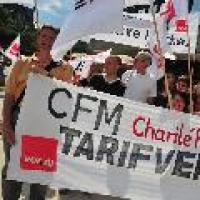
Hospital workers achieve minimum wage
The non-medical workers at Europe’s biggest university hospital group, Charité in Berlin, struck for 89 days (from 12 September to 9 Dec). They fought against low wages, bad working conditions and for a collective bargaining agreement.
Scandalous conditions
The company CFM (Charité Facility Management) was outsourced and partly privatised in 2006 under a Berlin coalition government of the SPD (Social Democrats) and the PDS (predecessor of the Left Party). The regional government still owns 51% of the company which makes it an even bigger scandal that wages of under €7 per hour were paid and that the workers do not have a collective bargaining agreement. In a survey which was done by the public sector union ver.di and the solidarity committee for the CFM workers, it was revealed that 59% of the workers suffer from high levels of pressure of time, 75% from the effects of a lack of staffing, 42.5% have work-connected health problems and 39% go to work even when they are ill.
Courage and complications
Already in May, the CFM workers struck for two weeks and achieved the beginning of collective bargaining negotiations. However, management did not make any acceptable offer so the negotiations were correctly stopped by the trade unions and a strike was prepared at the end of August. Management reacted with a divide and rule tactic. They gave limited concessions to some sections of the workforce and got support for that from one of the three trade unions which are present in the company, the IG BAU (building workers’ union which organises cleaning workers as well). This and the complicated structure of the workforce (25% only have time-limited contracts and usually do not dare to strike, over 30% are not actually employed by CFM but by Charité on better conditions) meant that the strike was difficult and only a minority of the workforce participated. However, the strikers showed great courage and dedication and always made clear that their struggle is a political one for workers’ rights in general.
Solidarity
SAV members and trade unionists had initiated a solidarity committee for the CFM workers in May. This committee had produced (together with ver.di) a “Black Book CFM” about the bad working conditions and the fight for a collective bargaining agreement and played an important role in the 89 days of the strike. Three activists from the solidarity committee were co-opted onto the strike committee. Many workers and strike leaders said that it would not have been possible for the strike to develop in the way that it did without the solidarity committee. This was especially the case for the organisation of solidarity messages from all over the country and around the world. CWI members in many German cities but also in Austria and Wales organised pickets in front of offices of the private investors in the CFM company. But more importantly, solidarity on an important scale was organised in Berlin itself with two solidarity demonstrations of 700 to 1,000 participants. The solidarity committee was also instrumental in publishing a daily strike bulletin for the strikers and the rest of the workforces in CFM and Charité.
The CFM struggle was widely seen as a “model strike”, under so-called precarious conditions. In many outsourced and (partly) privatised service companies there exists no collective bargaining agreement and workers receive hunger wages.
Limits of the strike
Because of the relatively low participation in the strike, the economic effects were limited. Therefore it was clear very soon that political pressure would be decisive to achieve a success. Permanent vigils were therefore organised in front of the regional headquarters of the SPD and in front of the headquarters of the Charité management. Also flash mobs were organised in a big, central Berlin, book and music store which is connected to the Dussmann company, one of the private investors in the CFM.
For twelve weeks, there was no movement at all on the side of management. The bosses always said that they would not accept a collective bargaining agreement in the CFM.
Strike ends with partial success
The fact that management now has had to sign a contract with the trade unions in and of itself marks a success. The content of the contract is far from the workers’ demands but still marks a success.
First of all, a minimum wage of €8.50 was agreed from May 2012 onwards. This means an important increase in wages for about 500 to 600 workers. Also, management had to guarantee that negotiations about a collective bargaining agreement would begin in January 2012. Also, one-off payments were agreed. In an attempt to split the strikers, management insisted that the cleaning workers should not be part of that one-off payment (arguing that they had received a holiday pay in contrast to other workers). The strikers are now collecting donations to make a self-organised one-off payment for the cleaning workers possible.
Strikers voted, with over 80 percent in favour of accepting the contract and ending the strike. It was clear that a stepping up of the pressure or a widening of the strike would have been difficult before Christmas. But they all see this just as a first act in the play. The go back to work with their heads held high, preparing for new struggles in 2012. The ver.di full time official leading the strike, Sylvi Krisch, called the situation “a truce”. Workers go back to work to collect their troops, forge their weapons, get organised even better and prepare for a new round of strike action in the New Year.

Be the first to comment